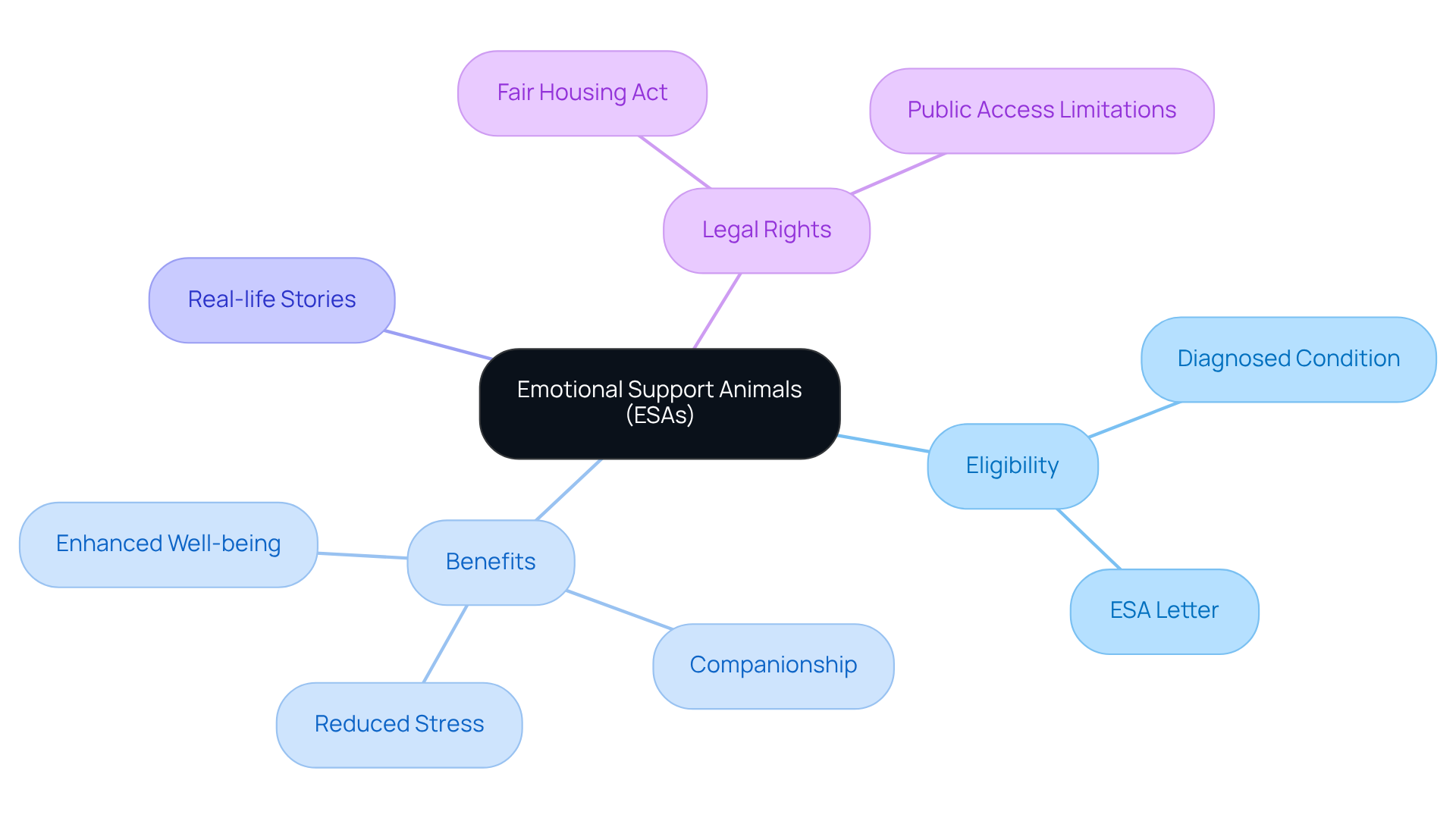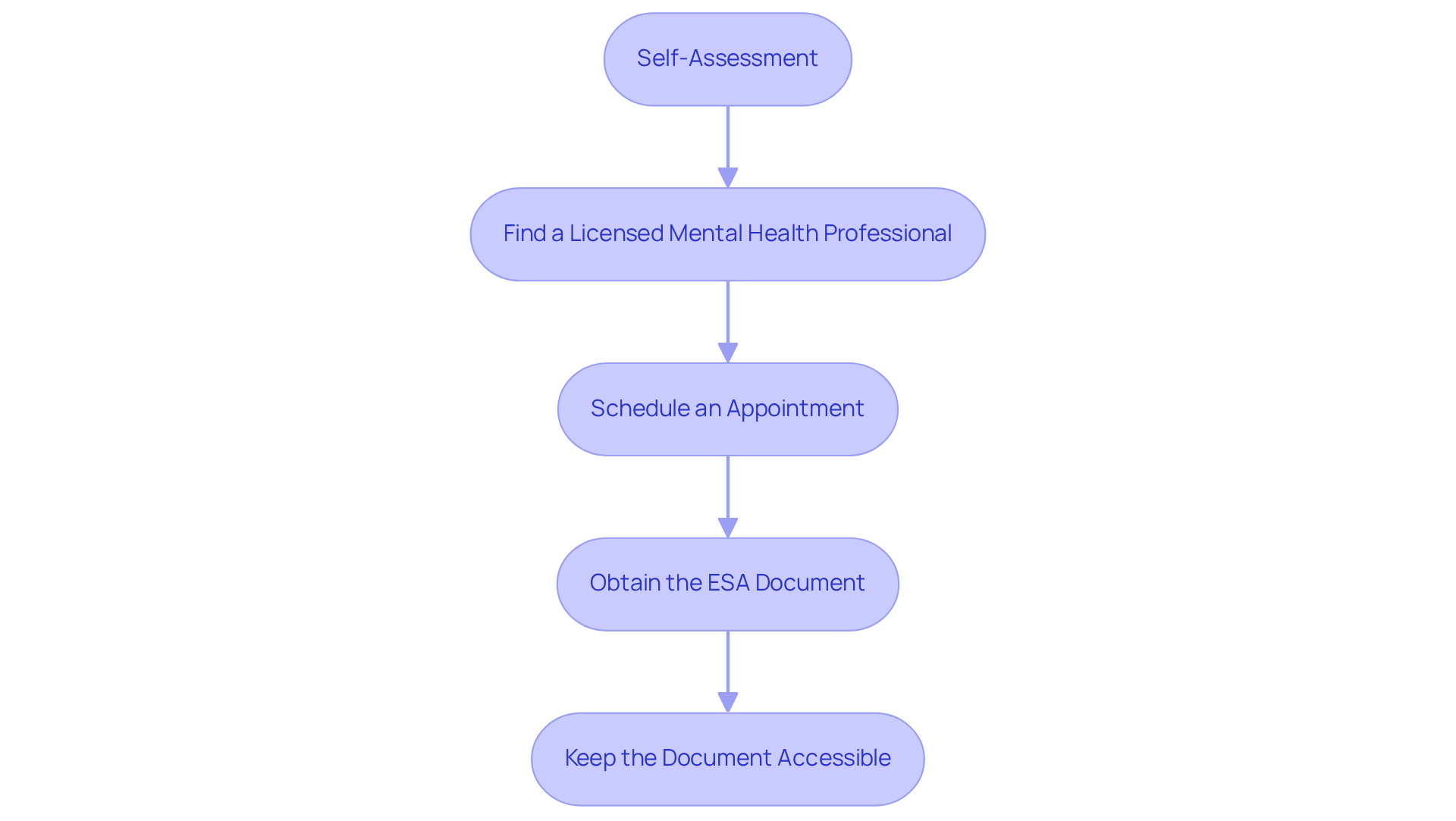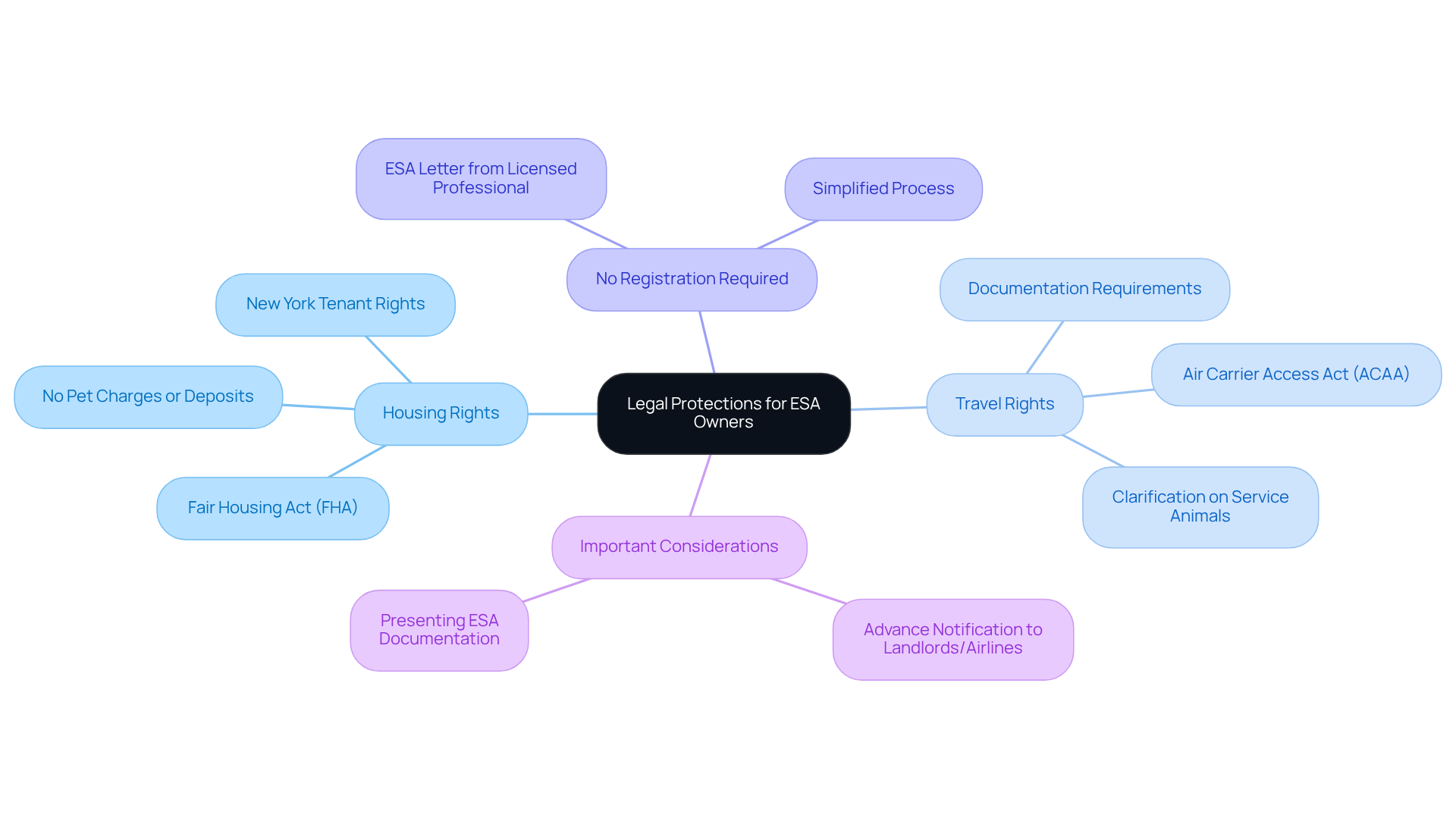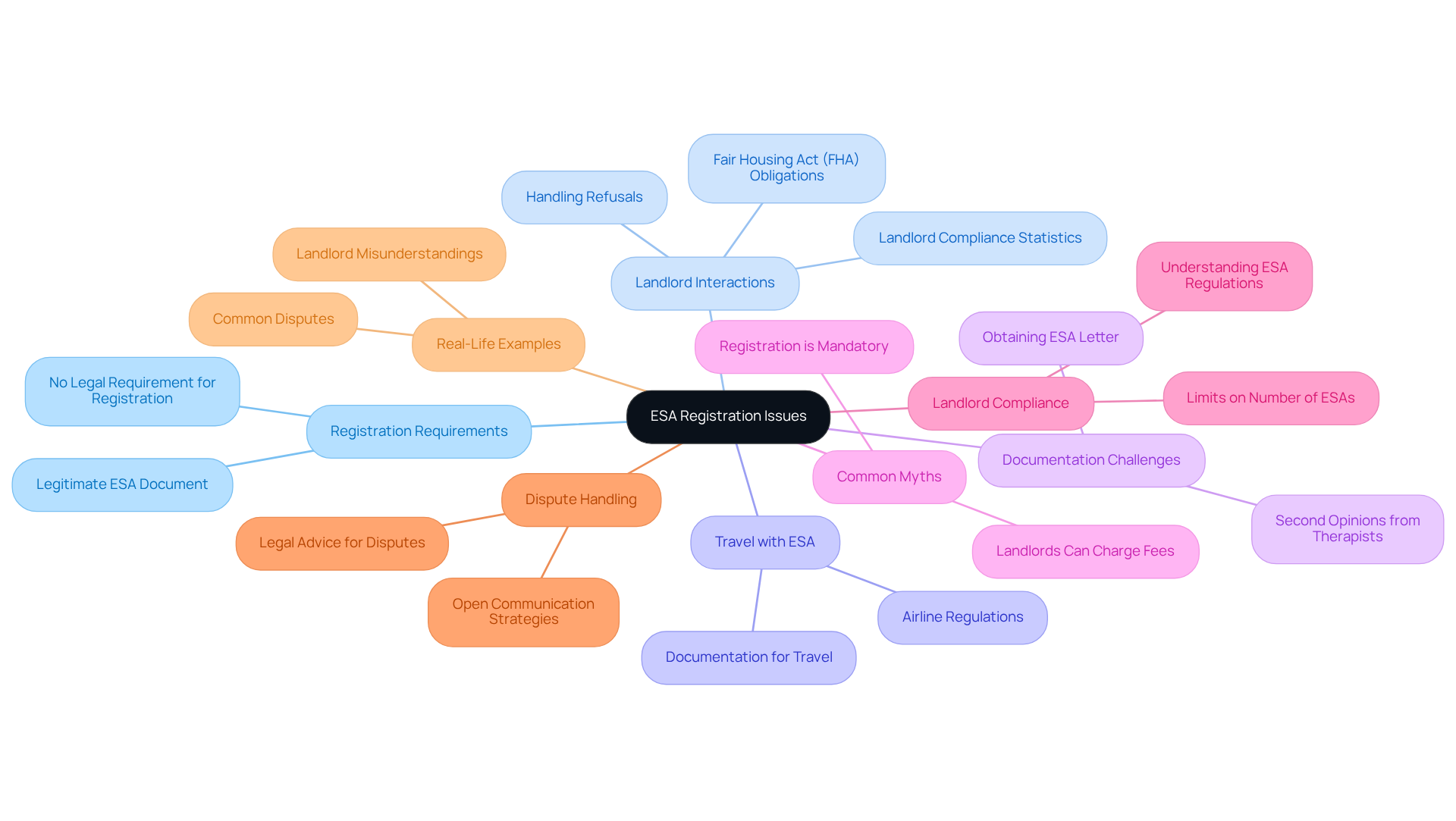

How to Get a Cat Registered as an Emotional Support Animal
by Lena Park
Last updated: August 13, 2025
Verified and Approved by:
Angela Morris,
MSW, LCSW
Fact Checked

Overview
To register a cat as an Emotional Support Animal (ESA), it is essential for the owner to have a diagnosed psychological condition and to obtain an ESA letter from a licensed mental health professional. This letter is crucial as it documents the need for the animal’s support.
Many individuals face emotional challenges, and the presence of an ESA can provide significant comfort and companionship.
It’s important to note that this letter is the only required documentation; ESAs do not need formal registration. This letter also grants legal rights under the Fair Housing Act, allowing individuals to live with their beloved cats in housing that typically restricts pets.
The support offered by ESAs can be transformative, creating a nurturing environment that promotes healing and well-being.
Introduction
Emotional Support Animals (ESAs) have become essential companions for those navigating emotional and psychological challenges, offering comfort and solace during difficult times. Among these cherished pets, cats hold a unique position, providing therapeutic benefits that can profoundly enhance one’s quality of life.
Yet, the path to officially recognizing a cat as an ESA can often be filled with uncertainty and confusion. What steps need to be taken to ensure that your feline friend is not only acknowledged but also legally protected as a source of emotional support?
This journey is not just about paperwork; it’s about securing the companionship that can make a meaningful difference in your life.
Understand Emotional Support Animals and Eligibility for Cats
Emotional Support Animals (ESAs) are beloved pets that provide comfort and companionship to individuals navigating emotional or psychological challenges. Unlike service animals, which are trained for specific tasks, ESAs do not require specialized training. To learn how to get a cat registered as an emotional support animal, the owner must have a diagnosed psychological health condition, such as anxiety, depression, or PTSD, and must demonstrate how the cat alleviates their symptoms. Consulting with a licensed health care professional (LHCP) is essential for evaluating eligibility and acquiring the required ESA letter, which provides guidance on how to get a cat registered as an emotional support animal and serves as official documentation of the need for emotional support.
Many individuals with psychological health conditions find solace in the companionship of ESAs. In fact, 18% of pet owners report having an ESA, highlighting the growing recognition of their therapeutic value. Psychological health experts emphasize that having a cat can provide significant emotional assistance, contributing to enhanced psychological well-being. Research indicates that 86% of pet owners feel their animals positively impact their emotional well-being, with numerous individuals citing decreased stress and anxiety as significant benefits.
Real-life stories abound, with countless individuals sharing how their cats have helped them cope with various emotional health challenges. These narratives underscore the profound importance of the human-animal bond and its potential to bolster emotional resilience. Engaging with a licensed health expert not only aids in the qualification process but also teaches you how to get a cat registered as an emotional support animal, ensuring that the therapeutic benefits of the cat are recognized and documented appropriately. Additionally, possessing an ESA document grants legal acknowledgment under the Fair Housing Act, allowing the owner to live with their animal in places where pets may typically be prohibited, such as college dormitories, thereby further supporting their emotional health needs. It is important to remember that while ESAs provide emotional support, they do not possess the same legal rights and access to public spaces as service dogs.

Obtain an ESA Letter: Step-by-Step Process
To obtain an ESA letter for your cat, please consider the following steps, keeping in mind the emotional support your feline friend can provide:
-
Self-Assessment: Take a moment to reflect on your mental health needs and how your cat offers emotional support. Many individuals have shared their experiences of significant decreases in anxiety and depression after welcoming an emotional support companion into their lives, underscoring the importance of this connection.
-
Find a Licensed Mental Health Professional: Seek out a therapist or psychiatrist who specializes in emotional support animals. You might explore online directories or ask for referrals from trusted sources. It’s crucial to ensure that the professional is licensed in your state, as only licensed health professionals can issue valid ESA letters.
-
Schedule an Appointment: Arrange a consultation to discuss your psychological health condition and the vital role your cat plays in your emotional wellbeing. During this session, the expert will assess your psychological health history and current symptoms to determine if an ESA is a suitable option for you.
-
Obtain the ESA Document: If the mental health professional concludes that you qualify, they will provide you with an ESA document. This document should include your name, the date, the professional’s license information, and a statement confirming your need for an emotional support animal. It’s essential that this document meets legal requirements to ensure its validity for housing and travel accommodations.
-
Keep the Document Accessible: Store the ESA document in a secure location, as you may need to present it for housing or travel accommodations. Having a digital copy on your phone can also be beneficial for immediate access when required.
Many success stories abound, with individuals recounting their positive experiences after figuring out how to get a cat registered as an emotional support animal, illustrating the emotional support these companions provide. Remember, while the process may take some time, the benefits of having your cat recognized as an emotional support companion can significantly enhance your quality of life.

Know Your Rights: Legal Protections for ESA Owners
As an Emotional Support Animal (ESA) owner, you hold specific legal protections under federal laws, particularly the Fair Housing Act (FHA) and the Air Carrier Access Act (ACAA). Understanding these rights is essential for ensuring that your ESA’s role in your life is recognized and respected.
Housing Rights: Under the FHA, landlords must make reasonable accommodations for tenants with ESAs, even in properties that enforce no-pet policies. This means they cannot impose pet charges or deposits for ESAs, allowing individuals with disabilities to live with their support companions without facing discrimination. For instance, renters in New York who possess a valid ESA document from Wellness Wag can request reasonable adjustments despite no-pet policies, reinforcing their rights under the law.
Travel Rights: The ACAA requires airlines to permit ESAs to travel with their owners, as long as the necessary documentation is provided. However, it’s vital to note that recent changes have clarified that emotional support animals are not classified as service animals, which may influence travel policies. Owners should ensure they have the appropriate ESA documentation from a licensed medical doctor ready when booking flights to avoid any complications.
No Registration Required: Unlike assistance animals, ESAs do not need registration or certification. The only documentation required is an ESA letter issued by a licensed mental health professional, confirming your need for the animal. This simplifies the process for individuals seeking emotional support by showing them how to get a cat registered as an emotional support animal through Wellness Wag’s swift evaluation and professional consultations, alleviating burdensome registration procedures.
Important Considerations: Always inform your landlord or airline in advance about your ESA to create a smoother experience. Be prepared to present your ESA documentation upon request to validate your rights and ensure compliance with housing and travel regulations.

Troubleshoot Common Issues and FAQs in ESA Registration
Here are some common issues and FAQs regarding ESA registration:
-
Do I need to register my cat as an ESA?
No, registration is not legally required. What you truly need is a legitimate ESA document from a licensed mental health expert, which verifies how to get a cat registered as an emotional support animal due to its therapeutic necessity. This document can be a vital part of your journey towards emotional wellness. -
What if my landlord refuses my ESA?
If your landlord denies your ESA, it’s important to remain calm. Present your ESA letter and gently remind them of their obligations under the Fair Housing Act (FHA), which mandates reasonable accommodations for tenants with emotional support animals. If issues persist, consider seeking legal advice to protect your rights and ensure you feel supported in your home. -
Can I take my ESA on a plane?
Yes, airlines must allow ESAs to travel with their owners, providing comfort during your journey. However, it’s important to note that Air Canada no longer acknowledges emotional support creatures for travel. Instead, psychiatric service dogs (PSDs) can travel with proper documentation, including a completed U.S. DOT form and notification to the Medical Assistance Desk 48 hours before the flight. Make sure you have your ESA documentation prepared for the airline, as it serves as proof of your animal’s status and the bond you share. -
What if my therapist won’t provide an ESA document?
If your current therapist is unwilling to provide an ESA letter, don’t lose hope. Consider seeking a second opinion from another licensed mental health professional who understands the benefits of ESAs. This can help you obtain the necessary documentation for how to get a cat registered as an emotional support animal to support your emotional needs and journey. -
What are some common myths about ESA registration?
Many misconceptions exist, such as the belief that registration is mandatory or that landlords can impose fees for ESAs. In reality, the FHA prohibits landlords from charging fees or deposits for emotional support creatures, as they are not classified as pets. Understanding this can empower you in your interactions with landlords. -
How many landlords comply with ESA regulations?
While compliance varies, a significant percentage of landlords are aware of the FHA and its requirements. Approximately 18% of pet owners in the U.S. have Emotional Support Animals (ESAs), highlighting the importance of understanding these regulations. However, misunderstandings can lead to disputes, making it essential for ESA owners to be informed about their rights and feel confident in their support. -
How can I handle disputes with my landlord regarding my ESA?
Open communication is key in these situations. Clearly present your ESA letter and educate your landlord about the FHA. If disputes arise, documenting all interactions and seeking legal counsel can help protect your rights and ensure you feel supported in your living environment. -
Are there real-life examples of disputes between landlords and ESA owners?
Yes, disputes often arise when landlords misunderstand their obligations under the FHA. For instance, some landlords may attempt to impose pet fees or deny requests for multiple ESAs without valid justification. These situations highlight the importance of clear communication and understanding of legal rights. Remember, landlords can only deny ESA requests if the animal poses a direct threat or causes significant damage, which is a critical aspect of the FHA.

Conclusion
Emotional Support Animals (ESAs) play a crucial role in enhancing the emotional well-being of individuals grappling with psychological challenges. Cats, in particular, offer significant comfort and companionship, making them wonderful candidates for this supportive role. For those looking to formalize this bond and access the legal protections available to ESA owners, understanding the process of getting a cat registered as an ESA is essential.
This article outlines the vital steps for obtaining an ESA letter:
- Self-assessment
- Finding a licensed mental health professional
- Importance of proper documentation
Knowing your rights under laws such as the Fair Housing Act and the Air Carrier Access Act is imperative, as these laws protect ESA owners from discrimination in housing and travel situations. Additionally, it addresses common misconceptions about ESA registration and provides practical solutions for potential disputes with landlords or airlines.
Ultimately, recognizing the significance of emotional support animals and understanding the registration process can empower individuals to advocate for their needs. Have you considered how a feline friend could bring you comfort? As you navigate the complexities of legal protections, the journey toward obtaining an ESA can profoundly impact your emotional health. Taking the necessary steps to secure an ESA letter not only strengthens the bond with your pet but also affirms your right to emotional support in various aspects of life.
Frequently Asked Questions
What are Emotional Support Animals (ESAs)?
Emotional Support Animals (ESAs) are pets that provide comfort and companionship to individuals dealing with emotional or psychological challenges. They do not require specialized training like service animals.
Who is eligible to have a cat as an Emotional Support Animal?
To have a cat registered as an ESA, the owner must have a diagnosed psychological health condition, such as anxiety, depression, or PTSD, and must demonstrate how the cat alleviates their symptoms.
How can someone get a cat registered as an Emotional Support Animal?
The process involves consulting with a licensed health care professional (LHCP) to evaluate eligibility and acquire the necessary ESA letter, which serves as official documentation of the need for emotional support.
What percentage of pet owners report having an ESA?
Approximately 18% of pet owners report having an Emotional Support Animal.
What are the benefits of having a cat as an ESA?
Having a cat as an ESA can provide significant emotional assistance, contributing to enhanced psychological well-being. Research shows that 86% of pet owners feel their animals positively impact their emotional well-being, with many citing decreased stress and anxiety.
What legal rights do ESA owners have under the Fair Housing Act?
Possessing an ESA document grants legal acknowledgment under the Fair Housing Act, allowing the owner to live with their animal in places where pets may typically be prohibited, such as college dormitories.
Do Emotional Support Animals have the same legal rights as service dogs?
No, ESAs do not possess the same legal rights and access to public spaces as service dogs.
Certify Your Emotional Support Animal Today

Why You Can Rely on Us?
At Wellness Wag, we believe your pet deserves care rooted in both science and compassion. Each article is carefully researched, written in clear language for pet owners, and then reviewed by qualified professionals to ensure the information is evidence-based, current, and practical for real-life care. Our goal is to help you feel confident in making informed decisions about your pet’s health and well-being.
Reviewed by
Angela Morris, MSW, LCSW
Angela is a licensed clinical social worker with 20 years of experience in patient advocacy and community mental health. She has assisted numerous clients with ESA evaluations and brings a deep understanding of disability accommodations, ensuring that all information is accurate, supportive, and practical.

Written by :
Lena Park
Last Updated :
August 13, 2025












